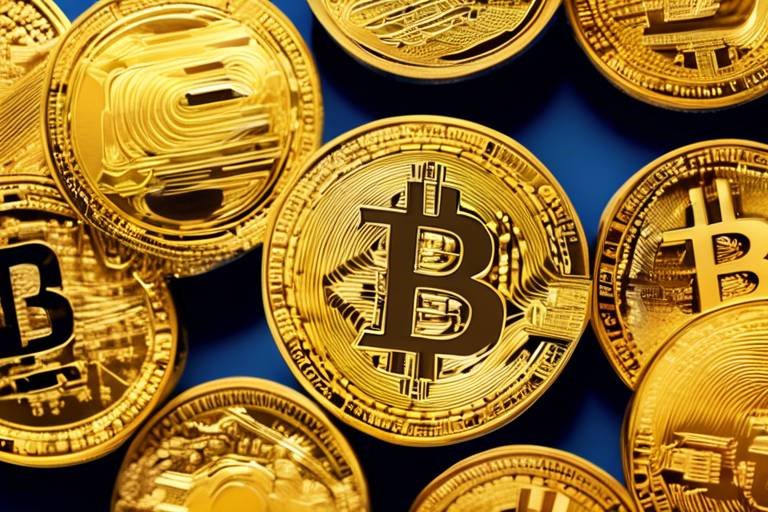How Economic Sanctions Affect Crypto Adoption
In today's interconnected world, the impact of economic sanctions on global finance is a hot topic, especially when it comes to the adoption of cryptocurrencies. As governments impose sanctions to exert pressure on targeted nations, the ripple effects can be felt far and wide, particularly in the realm of digital currencies. So, how do these sanctions influence the way cryptocurrencies are adopted and utilized? This article dives into the intricate relationship between economic sanctions and crypto adoption, shedding light on how these measures shape market dynamics, user behavior, and regulatory responses in various regions.
To fully grasp this relationship, it's essential to understand what economic sanctions are. Essentially, they are policy tools employed by governments to influence or punish nations, often in response to actions deemed unacceptable on the global stage. Sanctions can take many forms, including trade restrictions, asset freezes, and limitations on financial transactions. The intended effects are to cripple the targeted economy and force a change in behavior. However, the rise of cryptocurrencies has added a new layer of complexity to this equation. In many cases, these digital assets are seen as a means to bypass traditional financial systems that sanctions aim to disrupt.
As we explore the rise of cryptocurrency in sanctioned countries, it's fascinating to see how nations like Venezuela and Iran have turned to digital currencies as alternative financial solutions. Facing severe economic restrictions, these countries have found that cryptocurrencies provide a lifeline, granting them access to global markets and facilitating transactions in environments where traditional banking options are either limited or non-existent. This shift not only reflects the resilience of individuals in these nations but also highlights the growing importance of cryptocurrencies in a world where economic sanctions can have far-reaching consequences.
Economic sanctions are not a one-size-fits-all solution; they can vary significantly in their scope and impact. Here are some key types of sanctions:
- Comprehensive Sanctions: These impose broad restrictions on trade and financial transactions with a country.
- Targeted Sanctions: Also known as smart sanctions, these focus on specific individuals, entities, or sectors.
- Trade Sanctions: Restrictions on certain goods and services, often aimed at key industries.
- Financial Sanctions: Limitations on access to international financial systems, such as SWIFT.
The intended effects of these sanctions can vary. While they aim to weaken the economic stability of the targeted nation, they can also lead to unintended consequences, such as pushing these nations to adopt cryptocurrencies. This is where the fascinating interplay between sanctions and crypto adoption comes into play, as individuals and businesses in sanctioned countries seek alternative ways to transact and maintain economic viability.
In countries facing economic sanctions, cryptocurrencies have emerged as a beacon of hope. They offer a decentralized and often anonymous means of conducting transactions, which can be particularly appealing when traditional banking systems are compromised. For example, in Venezuela, the economic collapse has driven many citizens to explore digital currencies as a way to bypass hyperinflation and access international markets. The ability to transact without relying on local currency has proven invaluable.
Moreover, the use of cryptocurrencies in sanctioned countries is not just a trend; it's becoming a necessity. Individuals are finding innovative ways to use digital assets to facilitate trade, support local economies, and even engage in international commerce. This shift has significant implications for the global crypto market, creating a dynamic where geopolitical tensions can lead to increased demand for digital currencies.
Venezuela and Iran serve as prime examples of how sanctions have accelerated crypto adoption. In Venezuela, the government even launched its own cryptocurrency, the Petro coin, as a state-backed effort to combat the crippling effects of sanctions. However, the success of this initiative has been mixed, as many citizens remain skeptical about its viability and trustworthiness.
On the other hand, Iran has witnessed a surge in crypto mining activities as a direct response to sanctions. With relatively cheap electricity, many Iranians have turned to mining as a way to generate income and circumvent financial barriers. This trend not only impacts the national economy but also influences international relations, as countries grapple with the implications of crypto mining in sanctioned regions.
Sanctions can significantly affect global cryptocurrency markets, creating volatility and influencing trading patterns. When geopolitical tensions rise, investor sentiment can shift dramatically, leading to fluctuations in crypto prices. This volatility can be both a challenge and an opportunity for traders and investors alike. Understanding how these dynamics play out is crucial for anyone looking to navigate the complex world of digital currencies.
As cryptocurrency adoption rises in sanctioned countries, governments around the world are increasingly scrutinizing its use. Regulatory responses are evolving, as authorities seek to balance the need for oversight with the desire to foster innovation. This regulatory landscape is crucial for ensuring that cryptocurrencies are used responsibly and do not facilitate illicit activities.
Different countries have adopted varying regulatory approaches to cryptocurrencies, creating a patchwork of laws and guidelines. Some nations embrace the technology, while others impose strict regulations to curb its growth. This inconsistency can create challenges for users and businesses operating in the crypto space.
Crypto exchanges face significant compliance challenges when dealing with users from sanctioned countries. They must implement stringent measures to adhere to regulations while still facilitating transactions. This balancing act is essential for maintaining the integrity of the crypto market and ensuring that it remains a viable option for users worldwide.
Q: How do economic sanctions impact cryptocurrency prices?
A: Economic sanctions can create volatility in cryptocurrency prices as they influence investor sentiment and trading patterns. Geopolitical tensions often lead to increased demand for digital currencies as a safe haven.
Q: Are cryptocurrencies a viable alternative for countries under sanctions?
A: Yes, cryptocurrencies provide a decentralized means of conducting transactions, allowing individuals and businesses in sanctioned countries to access global markets and maintain economic activity.
Q: What are the regulatory challenges for crypto exchanges?
A: Crypto exchanges must navigate a complex regulatory landscape, ensuring compliance with local and international laws while facilitating transactions for users from sanctioned countries.

Understanding Economic Sanctions
Economic sanctions are powerful policy tools wielded by governments to influence, punish, or compel nations to change their behavior. These measures can take various forms, including trade restrictions, asset freezes, and financial penalties. The primary goal of sanctions is often to exert pressure on a targeted country to alter its policies or actions, particularly regarding issues like human rights violations, military aggression, or nuclear proliferation. However, the impact of these sanctions extends beyond the immediate political objectives; they can also reshape economic landscapes and affect the adoption of technologies, including cryptocurrencies.
There are generally two types of economic sanctions: unilateral sanctions, which are imposed by one country independently, and multilateral sanctions, which are enacted by multiple nations or international organizations. Each type of sanction can have different implications for the targeted economy. For instance, unilateral sanctions might be more straightforward to implement but can lead to significant backlash, while multilateral sanctions often carry more weight and legitimacy but can be slower to enact.
The intended effects of these sanctions are multifaceted. On one hand, they aim to disrupt the economy of the targeted nation, leading to inflation, shortages, and social unrest. On the other hand, they can inadvertently push affected populations toward alternative financial systems, such as cryptocurrencies. In many instances, these digital assets offer a way to bypass traditional financial channels that may be restricted due to sanctions. As a result, we are witnessing a unique intersection where economic sanctions and cryptocurrency adoption converge, creating both challenges and opportunities for affected nations.
To illustrate the impact of sanctions on economies, consider the following table that outlines some common types of sanctions and their implications:
| Type of Sanction | Description | Potential Impact |
|---|---|---|
| Trade Restrictions | Limits on imports and exports | Economic decline, shortages of goods |
| Asset Freezes | Blocking access to financial assets | Increased financial isolation |
| Financial Penalties | Fines imposed on governments or entities | Strain on economic resources |
As we delve further into the relationship between economic sanctions and cryptocurrency adoption, it becomes evident that these measures can serve as a double-edged sword. While they aim to cripple the targeted economy, they can also drive innovation and adaptation in the form of digital currencies. Affected populations often seek ways to maintain their economic stability, leading to a growing interest in cryptocurrencies, which can provide a lifeline in times of economic hardship.
In summary, understanding economic sanctions requires a nuanced perspective that considers both their intended and unintended consequences. As we continue to explore the rise of cryptocurrencies in sanctioned countries, it is essential to keep in mind the complex dynamics at play and how they shape the future of global finance.

The Rise of Cryptocurrency in Sanctioned Countries
In recent years, the world has witnessed a fascinating shift in how people in sanctioned countries engage with their economies. As traditional financial systems crumble under the weight of international sanctions, many individuals and businesses have turned to cryptocurrencies as a lifeline. This movement is not just a trend; it represents a profound change in the financial landscape, enabling people to access global markets and transact freely, even when their governments are isolated. The allure of digital currencies lies in their ability to bypass conventional banking barriers, providing a sense of financial autonomy that many have been stripped of.
Cryptocurrencies offer a unique solution for those living in countries facing economic restrictions. These digital assets can be sent and received without the need for intermediaries, making them particularly appealing for individuals who find themselves cut off from traditional banking services. The decentralized nature of cryptocurrencies means they are less susceptible to government control, allowing users to conduct transactions without fear of government intervention. This characteristic is especially critical in nations where the government may monitor or restrict financial activities.
Moreover, the rise of cryptocurrency in these regions has been accompanied by a growing community of users who are eager to explore the potential of blockchain technology. This community often shares knowledge and resources, helping new users navigate the complex world of digital assets. As a result, we see a burgeoning ecosystem of crypto enthusiasts, miners, and traders emerging from the shadows of economic hardship.
To illustrate the impact of cryptocurrencies in sanctioned countries, consider the following key factors:
- Access to Global Markets: Cryptocurrencies allow individuals to engage in international trade without the hindrance of traditional banking systems.
- Financial Independence: Digital currencies provide a means of preserving wealth and conducting transactions without government oversight.
- Innovation and Entrepreneurship: The adoption of cryptocurrencies has sparked a wave of innovation, with many entrepreneurs developing new projects and services tailored to their local needs.
As we delve deeper into this phenomenon, it's essential to recognize that the rise of cryptocurrency in sanctioned countries is not merely a response to economic hardship; it represents a broader movement towards financial inclusion and empowerment. People are taking control of their financial destinies, leveraging technology to create new opportunities where traditional systems have failed. This transformation is not without its challenges, but the resilience and creativity demonstrated by those in these regions offer a glimpse into a future where financial freedom is within reach for everyone.
Q: How do cryptocurrencies help people in sanctioned countries?
A: Cryptocurrencies provide a means for individuals to access global markets, conduct transactions without government oversight, and preserve their wealth in unstable economies.
Q: Are there any risks associated with using cryptocurrencies in sanctioned countries?
A: Yes, users may face legal repercussions, security risks, and volatility in the value of digital assets. It's crucial to proceed with caution and stay informed.
Q: Can cryptocurrencies replace traditional currencies in these regions?
A: While cryptocurrencies offer an alternative, they may not completely replace traditional currencies due to regulatory challenges and market volatility.

Case Studies: Venezuela and Iran
When we look at the impact of economic sanctions, Venezuela and Iran stand out as compelling case studies. Both countries have faced severe economic restrictions, compelling them to explore alternative financial avenues, particularly in the realm of cryptocurrencies. In Venezuela, the economic turmoil has driven citizens to seek out digital currencies as a means of survival. The government, recognizing this shift, launched the Petro coin, a state-backed cryptocurrency aimed at circumventing the sanctions and stabilizing its economy. However, the Petro has faced significant skepticism, with many questioning its viability and actual backing. Despite these challenges, it represents an innovative attempt to leverage blockchain technology in a country grappling with hyperinflation and a collapsing economy.
On the other hand, Iran has taken a different approach. With sanctions crippling its economy, Iran has witnessed a surge in crypto mining. The country possesses abundant energy resources, making it an attractive location for miners looking to capitalize on the low electricity costs. This boom in mining not only provides a potential revenue stream for the Iranian government but also allows citizens to engage in a global market that is otherwise closed off to them. The Iranian government has even recognized the importance of this sector, issuing licenses to miners and promoting it as a legitimate industry. However, this has raised concerns about energy consumption and international relations, as the country seeks to balance its domestic needs with the pressures of global sanctions.
To illustrate the contrasting strategies of these two nations, let's take a closer look at their respective approaches:
| Country | Sanction Response | Key Cryptocurrency Initiative | Challenges |
|---|---|---|---|
| Venezuela | Adoption of cryptocurrencies for daily transactions | Petro Coin | Lack of trust and market acceptance |
| Iran | Expansion of crypto mining | Licensing of mining operations | Energy consumption and regulatory scrutiny |
In summary, while both Venezuela and Iran have turned to cryptocurrencies as a response to economic sanctions, their methods and the challenges they face differ significantly. Venezuela's state-backed Petro coin attempts to create a new financial framework but struggles with credibility, while Iran's focus on crypto mining offers a practical solution to economic isolation but raises questions about sustainability and international relations. These case studies not only highlight the adaptability of nations under pressure but also underscore the evolving landscape of cryptocurrency adoption in response to geopolitical challenges.

Venezuela's Petro Coin
The introduction of the Petro coin in Venezuela marked a bold attempt by the government to navigate the treacherous waters of international sanctions. Launched in 2018, the Petro was touted as the world’s first state-backed cryptocurrency, designed to stabilize the economy and provide a means of circumventing the crippling effects of sanctions imposed by various nations, particularly the United States. Imagine being in a boat with holes, desperately trying to stay afloat; that’s how Venezuela felt, and the Petro was their makeshift patch.
Initially, the Petro was pegged to the country's oil reserves, which sounds promising on paper. However, the reality was far more complex. The Venezuelan government claimed that each Petro was backed by a barrel of oil, creating a perception of value. Yet, skepticism loomed large. Many questioned whether the government could actually deliver on this promise, given the rampant hyperinflation and economic mismanagement that plagued the nation. In essence, the Petro was like a mirage in a desert—appealing but elusive.
Despite the skepticism, the Petro coin found some traction. The Venezuelan government mandated its use for various transactions, including tax payments and the purchase of government services, effectively forcing its adoption. This move was akin to a lifebuoy thrown to drowning citizens, but the question remained: was it a sustainable solution? While some individuals embraced the Petro as a way to escape the traditional banking system, others remained wary, preferring to use more established cryptocurrencies such as Bitcoin and Ethereum.
To better understand the impact of the Petro coin, let’s take a look at a few key aspects:
| Aspect | Description |
|---|---|
| Backing | Initially pegged to oil reserves, leading to questions about its actual value. |
| Government Mandate | Required for tax payments and certain government services, increasing its use. |
| Public Perception | Mixed; some view it as a necessary tool, while others are skeptical of its legitimacy. |
Furthermore, the Petro’s journey has not been without its hurdles. The lack of infrastructure, technological know-how, and a supportive ecosystem made it difficult for the coin to gain widespread acceptance. Many Venezuelans, already grappling with economic turmoil, found it challenging to adapt to yet another financial system. In many ways, the Petro coin was a double-edged sword—offering hope but also presenting new challenges.
In conclusion, while the Petro coin was envisioned as a beacon of financial innovation amid chaos, its actual execution has been fraught with obstacles. The Venezuelan government continues to push for its adoption, but the road ahead is uncertain. As the world watches, the Petro stands as a testament to how countries under sanctions are seeking alternative solutions, even if those solutions are not yet fully realized.
- What is the Petro coin? The Petro coin is Venezuela's state-backed cryptocurrency, launched to combat economic sanctions and stabilize the economy.
- How is the Petro coin backed? It was initially pegged to the country's oil reserves, although the actual backing has been questioned.
- Is the Petro coin widely accepted in Venezuela? While the government mandates its use for certain transactions, public acceptance varies, with many preferring established cryptocurrencies.
- What challenges does the Petro face? The Petro faces challenges such as lack of infrastructure, public skepticism, and economic instability.

Iran's Crypto Mining Boom
In recent years, Iran has witnessed a remarkable surge in cryptocurrency mining, driven largely by the economic sanctions imposed by various countries. These sanctions have created a challenging financial environment, pushing individuals and businesses to seek alternative avenues for generating income. Crypto mining has emerged as a viable solution, allowing Iranians to tap into the global digital economy despite the restrictions they face. But what exactly is fueling this boom?
One of the primary factors is the country's abundant natural resources, particularly its cheap electricity. Iran has some of the lowest electricity prices in the world, making it an attractive location for mining operations. Miners can set up extensive operations without incurring exorbitant costs, which is crucial in a market where profit margins can be thin. This has led to an influx of both domestic and foreign miners seeking to capitalize on the favorable conditions.
However, the mining boom isn't without its challenges. The Iranian government has taken a somewhat ambivalent stance towards cryptocurrency mining. While they recognize its potential to generate revenue, they are also concerned about the environmental impact and the strain it places on the national grid. In fact, there have been instances where authorities have shut down operations to conserve electricity during peak times.
Despite these challenges, many Iranians remain undeterred. They view crypto mining as not just a means of income, but a way to assert financial independence in the face of crippling sanctions. The allure of cryptocurrencies lies in their ability to facilitate transactions that bypass traditional banking systems, which are often restricted due to sanctions. This has led to a burgeoning community of miners who are not only focused on profitability but also on the broader implications of their activities.
To illustrate the scale of this phenomenon, consider the following table that outlines the growth of crypto mining in Iran over recent years:
| Year | Estimated Miners | Bitcoin Mined (Annual) |
|---|---|---|
| 2018 | 10,000 | 1,000 BTC |
| 2019 | 30,000 | 2,500 BTC |
| 2020 | 50,000 | 5,000 BTC |
| 2021 | 70,000 | 8,000 BTC |
This table highlights the exponential growth in the number of miners and the amount of Bitcoin being mined annually. As the data shows, the mining community in Iran has expanded significantly, demonstrating a clear trend that aligns with the increasing demand for cryptocurrencies.
Furthermore, the Iranian government has recognized the potential of cryptocurrency mining as a source of revenue. They have started to issue licenses for mining operations, providing a legal framework that legitimizes the industry. This move not only helps in regulating the sector but also offers the government a way to tax these operations, which can be crucial for a country facing economic hardships.
In conclusion, Iran's crypto mining boom is a fascinating example of how economic sanctions can inadvertently foster innovation and entrepreneurship. As miners navigate the complexities of regulatory frameworks and market dynamics, they are not just participating in a financial revolution; they are also playing a pivotal role in reshaping the narrative around economic resilience in the face of adversity.
- What is cryptocurrency mining? - Cryptocurrency mining is the process of validating transactions on a blockchain network and adding them to the public ledger, often rewarded with new coins.
- Why is Iran's electricity so cheap? - Iran has significant energy resources, particularly natural gas, which allows the government to subsidize electricity costs for consumers and businesses.
- Are there any regulations on crypto mining in Iran? - Yes, the Iranian government has started to regulate the industry by issuing licenses, though enforcement and compliance can vary.
- How does crypto mining impact the environment? - Mining consumes a large amount of electricity, which can lead to increased carbon emissions, particularly if the energy comes from fossil fuels.

Impact on Global Crypto Markets
The ripple effects of economic sanctions on global crypto markets are profound and multifaceted. When governments impose sanctions, they often aim to destabilize the economies of targeted nations. However, these measures can inadvertently lead to a surge in cryptocurrency adoption as individuals and businesses seek alternative financial avenues. This dynamic creates a unique intersection where traditional finance meets the burgeoning world of digital currencies, leading to significant market implications.
One of the most noticeable impacts is the increased volatility in cryptocurrency prices. As investors react to geopolitical tensions, they often flock to cryptocurrencies as a safe haven or a speculative investment. For instance, when news of sanctions breaks, we can observe a spike in trading volume across various exchanges. This behavior is driven by the perception that cryptocurrencies can provide a hedge against traditional market instability. In fact, studies have shown that during periods of heightened geopolitical tension, the price of Bitcoin can experience dramatic fluctuations, often moving in tandem with news cycles.
Moreover, the emergence of cryptocurrencies in sanctioned countries can lead to a shift in trading patterns. For example, countries like Venezuela and Iran have seen a rise in local exchanges that facilitate crypto transactions, allowing citizens to bypass traditional banking systems. This not only democratizes access to financial resources but also creates a new layer of complexity in the global crypto market. As these nations become more integrated into the crypto ecosystem, they can influence overall market trends, leading to a more interconnected and, at times, unpredictable market landscape.
Additionally, the regulatory responses from other nations can further complicate the situation. Governments around the world are grappling with how to respond to the rise of cryptocurrencies in sanctioned regions. Some countries may tighten regulations on crypto exchanges, while others could adopt a more lenient approach, aiming to attract investment and innovation. This patchwork of regulations can create confusion and uncertainty, impacting investor confidence and market stability.
To illustrate these impacts more clearly, consider the following table that summarizes the effects of sanctions on crypto market dynamics:
| Impact | Description |
|---|---|
| Increased Volatility | Heightened geopolitical tensions lead to rapid price changes in cryptocurrencies. |
| Shifts in Trading Patterns | Emergence of local exchanges in sanctioned countries facilitates crypto transactions. |
| Regulatory Responses | Varied responses from governments create a complex regulatory landscape. |
In conclusion, the impact of economic sanctions on global crypto markets is a double-edged sword. While these sanctions can drive individuals towards cryptocurrencies as a means of financial survival, they also introduce a level of unpredictability that can unsettle even the most seasoned investors. As the world continues to grapple with the implications of sanctions, the relationship between traditional finance and cryptocurrencies will likely grow more intricate, creating both challenges and opportunities for market participants.
- How do economic sanctions influence cryptocurrency prices?
Economic sanctions can lead to increased volatility in cryptocurrency markets as investors react to geopolitical tensions, often causing price fluctuations. - Are cryptocurrencies a viable alternative for sanctioned countries?
Yes, cryptocurrencies provide an alternative financial solution for individuals and businesses in sanctioned countries, allowing them to bypass traditional banking systems. - What are the regulatory challenges for crypto exchanges?
Crypto exchanges face compliance challenges when dealing with users from sanctioned countries, necessitating strict adherence to regulations while facilitating transactions.

Regulatory Responses to Crypto Adoption
As the world of cryptocurrencies continues to evolve, so does the regulatory landscape surrounding it, particularly in countries under economic sanctions. Governments are increasingly recognizing the potential of digital currencies to disrupt traditional financial systems, and this has prompted a wave of scrutiny and regulatory responses. The challenge lies in balancing innovation with the need to prevent illicit activities such as money laundering and terrorism financing. In this context, countries are adopting various approaches to regulate cryptocurrencies, aiming to create a framework that can address the unique challenges posed by their use in sanctioned economies.
One significant aspect of regulatory responses is the establishment of compliance measures that crypto exchanges must implement. These measures are designed to ensure that these platforms do not inadvertently facilitate illegal activities. For instance, many exchanges are now required to conduct thorough Know Your Customer (KYC) processes to verify the identities of their users. This not only helps in maintaining the integrity of the financial system but also protects the exchanges from potential legal repercussions. The need for compliance has led to the development of sophisticated technologies and protocols that can monitor transactions in real-time, providing a layer of security for both users and regulators.
The international regulatory landscape is also in flux, as different countries adopt varying approaches to cryptocurrency regulation. Some nations have embraced cryptocurrencies, creating a welcoming environment for innovation, while others have imposed strict bans. For instance, countries like El Salvador have recognized Bitcoin as legal tender, whereas China has taken a hard stance against cryptocurrency trading and mining. This disparity creates a complex web of regulations that can be challenging for businesses and users alike. To navigate this landscape, many companies are investing in legal expertise to ensure compliance with the myriad of regulations that exist globally.
Moreover, the regulatory responses to crypto adoption are not static; they evolve as the market matures. As more data becomes available regarding the use of cryptocurrencies in sanctioned countries, regulators are likely to adjust their strategies. For example, the Financial Action Task Force (FATF) has been actively working on guidelines that countries can adopt to regulate cryptocurrencies effectively. These guidelines emphasize the importance of transparency and cooperation among nations to combat the misuse of digital currencies.
In conclusion, the regulatory responses to cryptocurrency adoption in sanctioned countries are multifaceted and dynamic. While there is a growing recognition of the potential benefits that cryptocurrencies can offer, particularly in restricted economies, there is also a pressing need to ensure that these innovations do not facilitate illicit activities. As the landscape continues to evolve, it will be fascinating to observe how different countries navigate the challenges and opportunities presented by cryptocurrencies.
- What are economic sanctions? Economic sanctions are policy measures imposed by governments to influence or punish other nations, often affecting trade and financial transactions.
- How do economic sanctions impact cryptocurrency adoption? Sanctions can push individuals and businesses in affected countries to seek alternative financial solutions, such as cryptocurrencies, to bypass restrictions.
- What are the compliance challenges for crypto exchanges? Crypto exchanges must implement strict KYC processes and monitor transactions to comply with regulations, especially when dealing with users from sanctioned countries.
- How are international regulatory frameworks adapting to cryptocurrencies? Different countries are adopting varying regulatory approaches, with some embracing cryptocurrencies while others impose strict bans, creating a complex regulatory environment.

International Regulatory Frameworks
As the adoption of cryptocurrencies continues to rise, particularly in countries facing economic sanctions, the need for a robust international regulatory framework has never been more critical. Governments and regulatory bodies around the world are grappling with how to approach the rapidly evolving landscape of digital currencies. The challenge lies in balancing the promotion of innovation while ensuring compliance with existing laws and safeguarding against illicit activities. This creates a complex environment where regulations can vary significantly from one jurisdiction to another.
One of the primary factors influencing the regulatory landscape is the geopolitical climate. Countries that impose sanctions often find themselves at odds with nations that embrace cryptocurrency as a means to circumvent those sanctions. This divergence creates a patchwork of regulations that can be confusing for businesses and individuals alike. For instance, while some countries have embraced cryptocurrencies and established clear guidelines, others have imposed outright bans or stringent restrictions. This inconsistency can lead to uncertainty in the market, making it challenging for investors and businesses to navigate.
To better understand the international regulatory frameworks surrounding cryptocurrencies, consider the following key aspects:
- Regulatory Approaches: Different countries adopt different regulatory approaches to cryptocurrencies. Some, like the United States, have taken a more cautious stance, implementing regulations that focus on anti-money laundering (AML) and know your customer (KYC) policies. Others, like El Salvador, have embraced Bitcoin as legal tender, showcasing a more progressive regulatory environment.
- International Cooperation: Given the global nature of cryptocurrencies, international cooperation is essential. Organizations like the Financial Action Task Force (FATF) are working to establish guidelines that promote consistency across borders. However, achieving consensus among nations with differing interests can be a daunting task.
- Technological Adaptation: As technology evolves, so too must the regulations that govern it. Many regulatory bodies are now looking at how blockchain technology can be leveraged to enhance transparency and security in financial transactions.
In addition to these aspects, the emergence of decentralized finance (DeFi) platforms presents further regulatory challenges. DeFi operates without traditional intermediaries, making it difficult for regulators to enforce compliance. This has led to calls for new regulatory frameworks that can address the unique characteristics of DeFi while still protecting consumers and maintaining financial stability.
As we move forward, it's clear that the relationship between cryptocurrency and regulation will continue to evolve. Countries will need to adapt their regulatory frameworks to keep pace with technological advancements and the shifting geopolitical landscape. The challenge will be finding a balance that fosters innovation while ensuring the integrity of financial systems worldwide.
- What are economic sanctions? Economic sanctions are policy measures imposed by countries to influence or punish other nations, typically for political reasons.
- How do economic sanctions impact cryptocurrency adoption? Sanctions often push countries to seek alternative financial solutions, leading to increased cryptocurrency adoption as a means to access global markets.
- What challenges do crypto exchanges face regarding regulations? Crypto exchanges must navigate complex regulatory environments, ensuring compliance with laws while serving users from sanctioned countries.
- Are there international standards for cryptocurrency regulation? Organizations like the FATF are working towards establishing international guidelines, but there is currently no uniform standard across all countries.

Compliance Challenges for Crypto Exchanges
In the rapidly evolving landscape of cryptocurrency, compliance challenges for crypto exchanges have become a hot topic, especially when it comes to users from sanctioned countries. These exchanges, which serve as the gateways for individuals to buy, sell, and trade cryptocurrencies, are increasingly under pressure to implement robust measures that ensure they are not inadvertently facilitating illegal activities or violating international laws. This situation creates a complex web of challenges that exchanges must navigate.
One of the primary challenges is the necessity for Know Your Customer (KYC) protocols. Exchanges are required to verify the identities of their users to prevent money laundering and other illicit activities. However, when dealing with users from sanctioned nations, the risk of running afoul of regulations increases significantly. For instance, if an exchange inadvertently allows a user from a sanctioned country to create an account, they could face hefty fines and legal repercussions. This has led many exchanges to adopt stricter KYC measures, often requiring extensive documentation that some users may find difficult to provide.
Moreover, the dynamic nature of sanctions adds another layer of complexity. Sanctions can change rapidly based on geopolitical developments, and exchanges must stay updated with the latest regulations. This can be particularly challenging for smaller exchanges that may not have the resources to monitor these changes effectively. As a result, they may choose to implement blanket bans on users from specific countries, which can limit access to legitimate users who simply want to engage in crypto trading.
To illustrate the compliance landscape, consider the following table that outlines key compliance challenges faced by crypto exchanges:
| Compliance Challenge | Description |
|---|---|
| Know Your Customer (KYC) | Verification of user identities to prevent illegal activities. |
| Monitoring Sanctions Lists | Keeping up-to-date with changing sanctions from various governments. |
| Risk Assessment | Evaluating the risk associated with users from certain regions. |
| Legal Liability | Potential legal consequences for non-compliance with regulations. |
Another significant challenge is the need for effective transaction monitoring. Exchanges must implement systems to detect suspicious activities that could indicate attempts to circumvent sanctions. This includes analyzing transaction patterns and flagging any unusual behavior. However, the decentralized nature of cryptocurrencies can make this task particularly daunting. Unlike traditional financial systems, where transactions can be easily traced, crypto transactions can be obfuscated, complicating the monitoring process.
Additionally, exchanges face pressure from both regulatory bodies and their user base. While regulators demand compliance with stringent rules, users often seek a seamless trading experience. Striking a balance between these two demands can be challenging. For instance, implementing rigorous KYC processes may deter some potential users who value privacy and anonymity, leading to a loss of business.
In conclusion, compliance challenges for crypto exchanges operating in a world of economic sanctions are multifaceted and continuously evolving. As the regulatory landscape shifts, exchanges must remain vigilant and adaptable, ensuring they not only comply with the law but also provide a secure and user-friendly platform for their clients. The future of crypto adoption in sanctioned countries will largely depend on how effectively these challenges are addressed.
- What are the main compliance challenges for crypto exchanges?
The main challenges include KYC verification, monitoring sanctions lists, transaction monitoring, and legal liability.
- How do sanctions affect crypto transactions?
Sanctions can restrict access to exchanges for users in certain countries, complicating legitimate trading activities.
- What measures can exchanges take to ensure compliance?
Exchanges can implement robust KYC processes, stay updated with sanction changes, and utilize advanced transaction monitoring systems.
Frequently Asked Questions
- What are economic sanctions?
Economic sanctions are measures imposed by countries to restrict trade and financial transactions with specific nations. They aim to influence or punish a country's behavior, often impacting its economy and, in turn, its financial systems, including cryptocurrencies.
- How do economic sanctions influence cryptocurrency adoption?
Sanctions can drive countries to adopt cryptocurrencies as alternative financial systems. When traditional banking channels are blocked, cryptocurrencies provide a way to conduct transactions, access global markets, and maintain economic activity, making them appealing in sanctioned regions.
- Can you give examples of countries where crypto adoption has surged due to sanctions?
Absolutely! Venezuela and Iran are notable examples. Venezuela has seen the introduction of the Petro coin to bypass sanctions, while Iran has experienced a boom in crypto mining as a response to economic restrictions, showcasing how these countries leverage digital currencies for economic resilience.
- What challenges do countries face when adopting cryptocurrencies under sanctions?
Countries face several challenges, including regulatory hurdles, technological barriers, and the need for infrastructure to support crypto transactions. Additionally, the global perception of cryptocurrencies can lead to further isolation if not managed properly.
- How do sanctions affect global cryptocurrency markets?
Sanctions can create volatility in global crypto markets, influencing investor sentiment and trading patterns. Geopolitical tensions often lead to rapid price fluctuations as traders react to news and developments related to sanctioned nations.
- What regulatory responses are emerging regarding crypto adoption in sanctioned countries?
Governments worldwide are increasingly scrutinizing cryptocurrency transactions from sanctioned countries. Regulatory frameworks are evolving to address compliance challenges, aiming to prevent money laundering and ensure that exchanges adhere to international laws.
- What compliance challenges do crypto exchanges face?
Crypto exchanges must navigate complex regulatory landscapes when dealing with users from sanctioned countries. They face challenges in implementing robust compliance measures, such as Know Your Customer (KYC) protocols, to avoid legal repercussions while facilitating transactions.



















